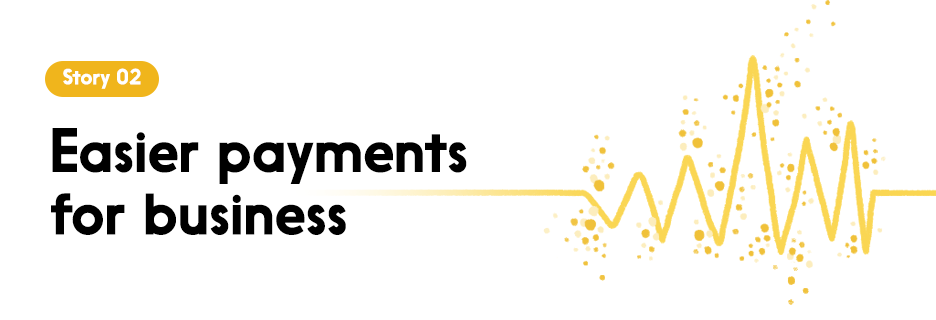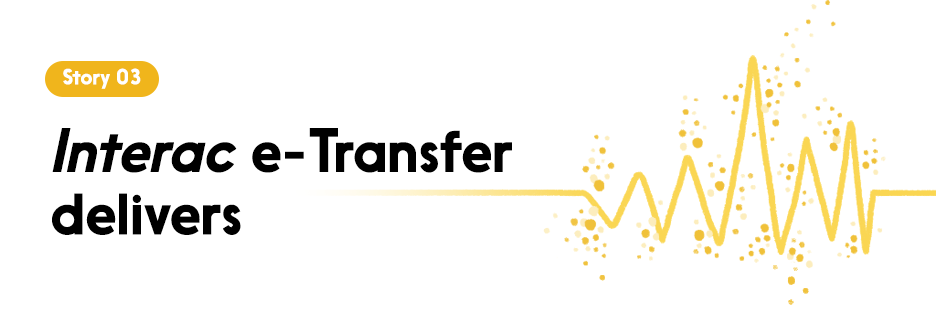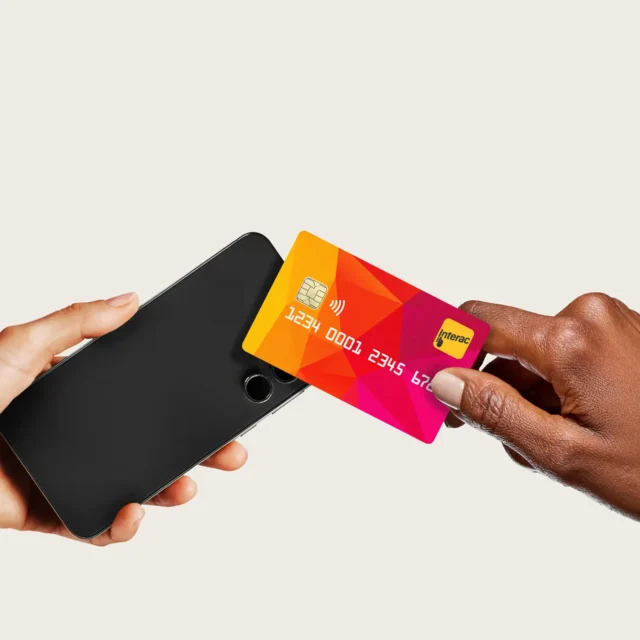October is always a busy time at Saunders Farm. For decades, many Ottawa-area families have cherished their annual visit to the bustling destination in the village of Munster, Ontario, for a walk through the pumpkin patch, a hayride and a fright at the haunted house.
The tradition continues this year. Yet things are operating a little differently because of COVID-19. To enable crowd control and physical distancing between guests, visits must be pre-booked and prepaid.
Saunders Farm went cashless, too, opting for contactless payments and digital money e-transfers to promote distancing. “Like most people, we went completely cashless,” says Mark Saunders, “Director of Fun” at Saunders Farm. Since 1976, his family has gradually expanded activities at the farm, from growing strawberries to serving as a popular agritourism site.
“From paying our bills to collecting money, Interac e-Transfer has been a game changer for us.”
How Interac provides support for small businesses as they adapt
Since the pandemic arrived in Canada in early 2020, businesses across the country have shown their resilience by pivoting in response. Many have survived thanks to improvisation and creative adaptation — not to mention digital payment tools from Interac that have given them a lifeline during the transition.
For Saunders Farm, the transition to a COVID-friendly business model had to happen quickly. “Overnight all of our weddings cancelled,” Mark says, “and all of our corporate picnics and company retreats and things like that also cancelled. We do many that are three and four thousand people.”
Mark and his year-round staff of nine managers started thinking up some new income streams. “We’re in a rural community and you can’t get grocery delivery and a few other things like that. So, we started up an online grocery store,” he says. It accepts money transfers via the Interac e-Transfer platform.
Another idea was physically distanced campfires on the grounds during the summer. Groups sat 30 metres apart. “People could bring their own camp chairs and sit around the campfire and have hot dogs and s’mores and some drinks. Everything is contactless and you sit there and enjoy a beautiful evening outside,” Mark says. And if patrons wanted to keep sitting past their scheduled slots? They could simply pay via an Interac e-Transfer transaction for more fireside time.
Mark says the simplicity of the Interac e-Transfer service helped with setting up experiments like these. Because it doesn’t require any complicated steps to start accepting payments — all you need is an email address or phone number and a Canadian bank account, and you’re set — the platform enables small businesses to accept money for new products and services instantly. “[Interac e-Transfer] has made it a lot easier to pivot,” Mark says.
And the money flows without delay. “We don’t have to wait for money to come in,” Mark says. “It literally gets put in your account right away.”
Small business idea: Go even smaller
On the other side of the country, the mass cancellation of weddings in March also dealt a blow for Joyce Ng’s Vancouver one-woman cake-making business, Cakes in a Box, which specializes in unique-looking and great-tasting creations.
“People were cancelling their orders, and I understand that it’s kind of a tough time,” Joyce says. She estimates that 80 per cent of her business vanished.
How did she respond? She kept baking, hoping that posting attractive cake photos on social media would win new customers. “With social media, consistency is king. I try to post every other day, but that means I need fresh content.”
It’s working. Now Joyce finds herself baking a lot of smaller cakes for smaller gatherings. “I didn’t realize this, but people hate making four-inch cakes.” She’s found a niche as one of a few bakers in Vancouver who offer them. (How many people will a four-inch cake feed? “Up to six, but if you’re ambitious? Two.”)
Interac e-Transfer Autodeposit — for busy small business owners
Like Saunders Farm, Cakes in a Box has gone cashless for business payments. To offer contactless payment when she delivers the baked goods, she has customers send her a money transfer via an Interac e-Transfer transaction.
“People are just extra careful now with contact. Pretty much everything I accept now is through Interac e-Transfer,” Joyce says. “That’s 100 per cent how I get my funds. So, I rely on it, to say the least.”
The smaller-cakes strategy has succeeded, and orders are rolling in again. When they do, the money goes right into Joyce’s bank account because she has enabled Interac e-Transfer Autodeposit. It’s quicker, and it helps her deal with a “problem” that all small-business owners would like to have: being busy.
“If I had to accept the payment and type in my security answer for the Interac e-Transfer transaction, there’s a potential for me to forget,” Joyce says. “The fact that Interac offers the Autodeposit function is great for me because I have such a crazy schedule.”

For many businesses across Canada, responding to the demands of the COVID-19 pandemic has accelerated a shift to digital transactions. Owners and managers are finding they appreciate the ease and convenience: payroll without cheques, sales without cash, and bookkeeping without paper invoices.
Montreal’s Atelier Coloré creates statement fashion items and accessories using colourful textiles. The business also runs an event space — or at least it did. “I opened and launched the new space on Feb. 29. The pandemic totally changed our plan for 2020 and forced us to close our doors for six whole months,” says owner Déborah Cherenfant.
With that side of the business on hold, Déborah started another: making masks. It was a natural transition for a business that’s all about fabrics.
It’s also been easy to use the Interac e-Transfer product more often, and in more contexts — such as paying suppliers. “I was doing this before the pandemic but it’s more frequent now, especially with suppliers who want to avoid dealing with cash,” Déborah says.
“It was necessary,” Déborah says about her shift to paying staff via Interac e-Transfer transactions. “Going to the bank to do simple transactions was becoming complicated.”
Tom Hawks, Centre Director and owner of two tutoring centres — Oxford Learning franchises in Pickering and Ajax, Ontario — has also adopted the Interac e-Transfer service for payroll.
The first weeks after COVID-19 hit Canada were chaotic for Oxford Learning: Schools closed, families locked down and a curriculum built on face-to-face coaching had to be rebuilt for online teaching (and eventually small-group teaching in classrooms retrofitted for physical distancing).
Accounting and payment processing practices changed quickly as well. For payroll, Tom used to issue cheques himself — but that was before the pandemic, when his employees all did their tutoring face-to-face at the learning centres. Now that many teachers no longer physically come to the centre, Tom has used Interac e-Transfer transactions to pay them instead.
Before the pandemic, many parents paid for their children’s tutoring with cash and cheques. Now, Hawks isn’t accepting cash and isn’t sure whether he will again after the pandemic is over.
“Interac e-Transfer has replaced handling cash, which is cleaner. There’s a record. It doesn’t interfere with the business flow. When a client came in and wanted to sit down and pay cash, we’d have to sit down, we’d have to count it, we’d have to write a receipt,” Hawks says.
When paying with an Interac e-Transfer transaction, the money transfer is instant and the “paper” trail is all digital — clean and orderly, like a well-run classroom.
And as for cheques? “Nobody’s offered in the last five months,” Hawks says.

For some small businesses, the unexpected challenges of pandemic lockdowns, closures and physical distancing have prompted them to embrace new, delivery-driven business models. On opposite sides of the country, Les Jardins Lakou and One Arrow Meats have two things in common: Both are startup food-oriented small businesses that satisfy a particular craving, and both have shifted to direct-to-consumer delivery in recent months.
And by accepting Interac e-Transfer transactions for contactless payments, both have been able to stay connected to their most loyal customers in a way that was comfortable and easy to implement.
Opened for business just last year and inspired by Haitian cultural traditions, Les Jardins Lakou is an eco-friendly farm in Dunham, Quebec (about 90 kilometres outside of Montreal), that specializes in fruits and vegetables for Afro-Caribbean cuisine. “Okra, sweet potato, chayote, callaloo — these are some examples of market products that clients of Jardins Lakou can find in their dishes,” says owner Jean-Philippe Vézina.
The pandemic meant loss of revenue because important clients, including restaurants and daycares, were forced to close. But Les Jardins Lakou also had a following in Montreal through its presence at farmers’ markets. Staying connected to those clients meant the business would still have an income stream.
“We focused mainly on memberships for our vegetable delivery baskets,” Jean-Philippe says, which are available for home delivery throughout the Montreal area.Les Jardins Lakou accepts Interac e-Transfer contactless payment transactions in part because a lot of clients don’t have credit cards. Jean-Philippe says he has also been paying suppliers, employees and making other digital payments via the Interac e-Transfer service. “It’s really advantageous in terms of fees for both the client and the entrepreneur.”
Heat Laliberte’s small business is also quite new (and delicious). Having formerly worked in some of Vancouver’s most famous high-end kitchens, he took an Indigenous entrepreneur program in 2017 and traded his chef’s whites for a butcher’s apron. “I came up with the idea to make bacon because I love making charcuterie so much,” Heat says.
One Arrow Meats products are now available through a number of grocery services, including delivery services. But Heat says the loyal customers he has met through farmers’ markets have truly kept One Arrow thriving through the pandemic.
“I’d say that One Arrow is a very grassroots business, really community-focused,” Heat says. “We focus on giving the customer a really good experience face-to-face. We try to make as much of a personal connection to them as we can.”
Customers who have a bacon craving can order their meats through One Arrow’s website and pay via an Interac e-Transfer digital payment . “A lot of people didn’t want to go out to grocery stores or the farmers’ market,” Heat says. “So, I started doing deliveries. I would go to people’s houses and drop off the bacon on the porch, and they would pay me with an Interac e-Transfer transaction.”
“I don’t know what I would do without the Interac e-Transfer service, because that’s how I’m getting paid during the pandemic. People don’t want to use cash,” Heat says.
Heat also pays people who occasionally work for him through Interac e-Transfer , and to pay the company that makes his labels.
Digital payments are tying Canadians together during the pandemic, while the strength of the relationships that small businesses build with their customers and suppliers is another lifeline. “I think people want to support local right now” Heat says. “It’s important to focus on your customer base and nurture relationships that you already have with people.”
Level up your business with Interac e-Transfer for Business, a secure, easy-to-use digital payment solution.



